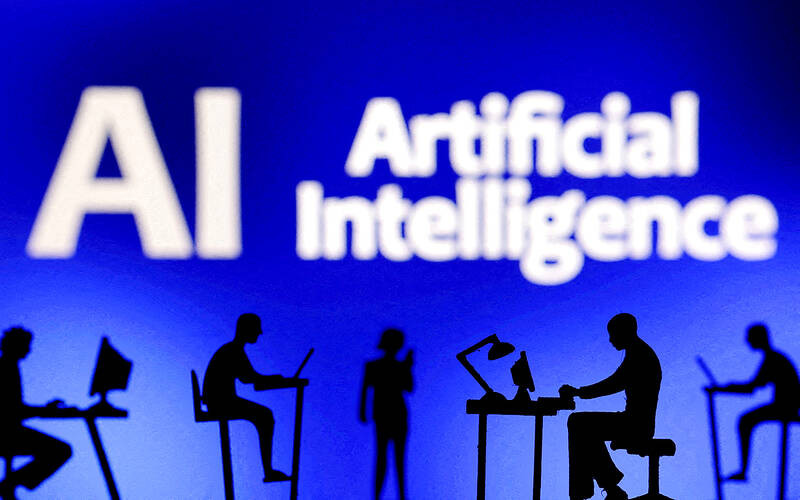Generative artificial intelligence assistants like ChatGPT are cutting into traditional online search traffic, depriving news sites of visitors and impacting the advertising revenue they desperately need, in a crushing blow to an industry already fighting for survival.
“The next three or four years will be incredibly challenging for publishers everywhere. No one is immune from the AI summaries storm gathering on the horizon,” warned Matt Karolian, vice president of research and development at Boston Globe Media. “Publishers need to build their own shelters or risk being swept away.”
While data remains limited, a recent Pew Research Center study reveals that AI-generated summaries now appearing regularly in Google searches discourage users from clicking through to source articles. When AI summaries are present, users click on suggested links half as often compared to traditional searches.

Photo: Reuters
This represents a devastating loss of visitors for online media sites that depend on traffic for both advertising revenue and subscription conversions. According to Northeastern University professor John Wihbey, these trends “will accelerate, and pretty soon we will have an entirely different web.”
The dominance of tech giants like Google and Meta had already slashed online media advertising revenue, forcing publishers to pivot toward paid subscriptions. But Wihbey noted that subscriptions also depend on traffic, and paying subscribers alone aren’t sufficient to support major media organizations.
LIMITED LIFELINES
The Boston Globe group has begun seeing subscribers sign up through ChatGPT, offering a new touchpoint with potential readers, Karolian said. However, “these remain incredibly modest compared to other platforms, including even smaller search engines.”
Other AI-powered tools like Perplexity are generating even fewer new subscriptions, he added.
To survive what many see as an inevitable shift, media companies are increasingly adopting GEO (Generative Engine Optimization) — a technique that replaces traditional SEO (Search Engine Optimization). This involves providing AI models with clearly labeled content, good structure, comprehensible text and strong presence on social networks and forums like Reddit that get crawled by AI companies.
But a fundamental question remains: “Should you allow OpenAI crawlers to basically crawl your Website and your content?” asks Thomas Peham, CEO of optimization startup OtterlyAI.
Burned by aggressive data collection from major AI companies, many news publishers have chosen to fight back by blocking AI crawlers from accessing their content.
“We just need to ensure that companies using our content are paying fair market value,” argued Danielle Coffey, who heads the News/Media Alliance trade organization.
Some progress has been made on this front. Licensing agreements have emerged between major players, such as the New York Times and Amazon, Google and Associated Press and Mistral and Agence France-Presse, among others.
But the issue is far from resolved, as several major legal battles are underway, most notably the New York Times’ blockbuster lawsuit against OpenAI and Microsoft.
LET THEM CRAWL
Publishers face a dilemma: blocking AI crawlers protects their content but reduces exposure to potential new readers. Faced with this challenge, “media leaders are increasingly choosing to reopen access,” Peham observed.
Yet even with open access, success isn’t guaranteed. According to OtterlyAI data, media outlets represent just 29 percent of citations offered by ChatGPT, trailing corporate Websites at 36 percent. And while Google search has traditionally privileged sources recognized as reliable, “we don’t see this with ChatGPT,” Peham noted.
The stakes extend beyond business models.
According to the Reuters Institute’s 2025 Digital News Report, about 15 percent of people under 25 now use generative AI to get their news.
Given ongoing questions about AI sourcing and reliability, this trend risks confusing readers about information origins and credibility — much like social media did before it.
“At some point, someone has to do the reporting,” Karolian said. “Without original journalism, none of these AI platforms would have anything to summarize.”
Perhaps with this in mind, Google is already developing partnerships with news organizations to feed its generative AI features, suggesting potential paths forward.
“I think the platforms will realize how much they need the press,” predicted Wihbey — though whether that realization comes soon enough to save struggling newsrooms remains an open question.

Taiwan can often feel woefully behind on global trends, from fashion to food, and influences can sometimes feel like the last on the metaphorical bandwagon. In the West, suddenly every burger is being smashed and honey has become “hot” and we’re all drinking orange wine. But it took a good while for a smash burger in Taipei to come across my radar. For the uninitiated, a smash burger is, well, a normal burger patty but smashed flat. Originally, I didn’t understand. Surely the best part of a burger is the thick patty with all the juiciness of the beef, the

The ultimate goal of the Chinese Communist Party (CCP) is the total and overwhelming domination of everything within the sphere of what it considers China and deems as theirs. All decision-making by the CCP must be understood through that lens. Any decision made is to entrench — or ideally expand that power. They are fiercely hostile to anything that weakens or compromises their control of “China.” By design, they will stop at nothing to ensure that there is no distinction between the CCP and the Chinese nation, people, culture, civilization, religion, economy, property, military or government — they are all subsidiary

This year’s Miss Universe in Thailand has been marred by ugly drama, with allegations of an insult to a beauty queen’s intellect, a walkout by pageant contestants and a tearful tantrum by the host. More than 120 women from across the world have gathered in Thailand, vying to be crowned Miss Universe in a contest considered one of the “big four” of global beauty pageants. But the runup has been dominated by the off-stage antics of the coiffed contestants and their Thai hosts, escalating into a feminist firestorm drawing the attention of Mexico’s president. On Tuesday, Mexican delegate Fatima Bosch staged a

Nov.10 to Nov.16 As he moved a large stone that had fallen from a truck near his field, 65-year-old Lin Yuan (林淵) felt a sudden urge. He fetched his tools and began to carve. The recently retired farmer had been feeling restless after a lifetime of hard labor in Yuchi Township (魚池), Nantou County. His first piece, Stone Fairy Maiden (石仙姑), completed in 1977, was reportedly a representation of his late wife. This version of how Lin began his late-life art career is recorded in Nantou County historian Teng Hsiang-yang’s (鄧相揚) 2009 biography of him. His expressive work eventually caught the attention